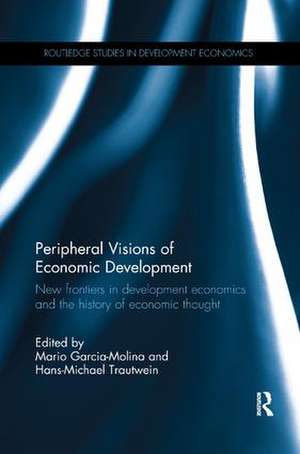Peripheral Visions of Economic Development: New frontiers in development economics and the history of economic thought: Routledge Studies in Development Economics
Editat de Mario Garcia-Molina, Hans-Michael Trautweinen Limba Engleză Paperback – 26 oct 2018
This book is divided into four parts. Following the introduction, the first set of papers describes the evolution of core-periphery perspectives in key contributions by Raúl Prebisch, Oskar Lange, Albert Hirschman, Celso Furtado and Homero Cuevas. The second set discusses the links between unbalanced productive structures and external trade in peripheral countries. The third set contains papers on critical episodes in the development of monetary and financial systems in Latin America during the 19th and 20th centuries. The fourth set deals with geographical and institutional aspects of path dependence in the governance of external trade and in the development of liberties, property rights and economic education in Europe, Latin America and Africa. Several chapters make use of hitherto unexplored archival material. Other chapters draw attention to important episodes or literatures that have largely gone unnoticed in the English-speaking world. Yet others combine conceptual innovations with work on new historical data and other sources hitherto not utilized in such contexts.
This book is ideal for those who study and research development economics, history of economic thought and economic history, especially in Latin America.
| Toate formatele și edițiile | Preț | Express |
|---|---|---|
| Paperback (1) | 419.11 lei 6-8 săpt. | |
| Taylor & Francis – 26 oct 2018 | 419.11 lei 6-8 săpt. | |
| Hardback (1) | 1171.40 lei 6-8 săpt. | |
| Taylor & Francis – 12 oct 2015 | 1171.40 lei 6-8 săpt. |
Din seria Routledge Studies in Development Economics
-
 Preț: 309.74 lei
Preț: 309.74 lei -
 Preț: 327.17 lei
Preț: 327.17 lei -
 Preț: 326.49 lei
Preț: 326.49 lei -
 Preț: 311.41 lei
Preț: 311.41 lei -
 Preț: 394.37 lei
Preț: 394.37 lei - 8%
 Preț: 396.84 lei
Preț: 396.84 lei -
 Preț: 260.82 lei
Preț: 260.82 lei - 18%
 Preț: 1165.24 lei
Preț: 1165.24 lei - 15%
 Preț: 470.31 lei
Preț: 470.31 lei - 18%
 Preț: 1057.05 lei
Preț: 1057.05 lei - 18%
 Preț: 1225.29 lei
Preț: 1225.29 lei - 18%
 Preț: 1113.63 lei
Preț: 1113.63 lei - 18%
 Preț: 1300.62 lei
Preț: 1300.62 lei - 26%
 Preț: 878.42 lei
Preț: 878.42 lei - 18%
 Preț: 1166.05 lei
Preț: 1166.05 lei - 18%
 Preț: 1059.45 lei
Preț: 1059.45 lei -
 Preț: 381.11 lei
Preț: 381.11 lei - 25%
 Preț: 823.63 lei
Preț: 823.63 lei - 21%
 Preț: 361.84 lei
Preț: 361.84 lei - 16%
 Preț: 274.01 lei
Preț: 274.01 lei - 18%
 Preț: 1060.87 lei
Preț: 1060.87 lei - 18%
 Preț: 1168.85 lei
Preț: 1168.85 lei - 18%
 Preț: 1171.89 lei
Preț: 1171.89 lei - 18%
 Preț: 1068.18 lei
Preț: 1068.18 lei - 18%
 Preț: 1060.19 lei
Preț: 1060.19 lei - 18%
 Preț: 1341.98 lei
Preț: 1341.98 lei - 18%
 Preț: 1169.16 lei
Preț: 1169.16 lei - 18%
 Preț: 1057.05 lei
Preț: 1057.05 lei - 15%
 Preț: 708.81 lei
Preț: 708.81 lei - 18%
 Preț: 1287.06 lei
Preț: 1287.06 lei - 18%
 Preț: 1124.73 lei
Preț: 1124.73 lei - 18%
 Preț: 1157.34 lei
Preț: 1157.34 lei - 27%
 Preț: 832.80 lei
Preț: 832.80 lei - 26%
 Preț: 850.91 lei
Preț: 850.91 lei - 18%
 Preț: 1066.79 lei
Preț: 1066.79 lei - 25%
 Preț: 658.19 lei
Preț: 658.19 lei - 25%
 Preț: 992.63 lei
Preț: 992.63 lei - 18%
 Preț: 1069.23 lei
Preț: 1069.23 lei - 15%
 Preț: 703.08 lei
Preț: 703.08 lei -
 Preț: 395.63 lei
Preț: 395.63 lei - 18%
 Preț: 706.91 lei
Preț: 706.91 lei -
 Preț: 419.92 lei
Preț: 419.92 lei - 18%
 Preț: 1055.38 lei
Preț: 1055.38 lei - 27%
 Preț: 993.85 lei
Preț: 993.85 lei - 18%
 Preț: 707.10 lei
Preț: 707.10 lei -
 Preț: 409.19 lei
Preț: 409.19 lei
Preț: 419.11 lei
Nou
Puncte Express: 629
Preț estimativ în valută:
80.19€ • 83.96$ • 66.36£
80.19€ • 83.96$ • 66.36£
Carte tipărită la comandă
Livrare economică 05-19 aprilie
Preluare comenzi: 021 569.72.76
Specificații
ISBN-13: 9780367110819
ISBN-10: 0367110814
Pagini: 356
Ilustrații: 46
Dimensiuni: 156 x 234 mm
Greutate: 0.52 kg
Ediția:1
Editura: Taylor & Francis
Colecția Routledge
Seria Routledge Studies in Development Economics
Locul publicării:Oxford, United Kingdom
ISBN-10: 0367110814
Pagini: 356
Ilustrații: 46
Dimensiuni: 156 x 234 mm
Greutate: 0.52 kg
Ediția:1
Editura: Taylor & Francis
Colecția Routledge
Seria Routledge Studies in Development Economics
Locul publicării:Oxford, United Kingdom
Public țintă
Postgraduate and UndergraduateCuprins
1. Introduction Mario Garcia-Molina and Hans-Michael Trautwein Part I: Core and periphery 2. Core and periphery in the early cold war: a historical analysis of development theory Natália Bracarense 3. Anarchic accumulation, un-effective demand and institutional constraints: Oskar Lange’s critique of capitalist dynamics in the core and the periphery Roberto Lampa 4. Development economics today: insights from Hirschman and Furtado Davide Gualerzi and Alan Cibils 5. Classical thought from the periphery: Homero Cuevas on non-basic goods and the standard commodity Mario Garcia-Molina and Julián Libreros Part II: Productive structures and external trade 6. Free trade and protectionism in primary export economies Pier Luigi Porta 7. CEPAL and the balance of payments constraint in the 1950s Mauro Boianovsky and Ricardo Solís 8. The unbalanced productive structure: a reconstruction of Marcelo Diamand’s contributions to economic theory Ariel Dvoskin and Germán Feldman 9. A reinterpretation of the ‘unbalanced productive structures’ Eduardo Crespo and Andrés Lazzarini Part III: Money and finance 10. 19th century monetary utopias in Latin-America: the influence of French liberalism on the Colombian free banking experiment Andrés Álvarez 11. Distributive conflict and monetary institutions in peripheral economies: the Argentine experience with the Exchange Office of 1867 Germán Feldman 12. The Gold-Exchange Standard in practice: banking devices and international monetary relations, 1890 – 1914 Eugenia Dinivitzer 13. The BIS and the Latin American debt crisis of the 1980s Piet Clement and Ivo Maes Part IV: Geography and institutions 14. Trade and colonization: the development of economic thought about two types of transnational governance Hans Michael Trautwein 15. Struggling for institutional change Merchant guilds, transimperial entangled economic policies, and Spanish backwardness: Havana in Atlantic perspective, 1792. Jesús Bohórquez 16. The teaching of political economy, circulation of ideas and economic performance: a review of the Colombian experience in the 19th century Claudia Milena Pico 17. Path dependence and interdependence in institutions: the Nigerian case David Fadiran and Mare Sarr
Recenzii
'...the sequential reading of all the chapters of the book produces a solid perspective. This seems to be due in particular to how the different perspectives relate to the broad theme of economic development. This debate gains in density and complexity throughout the chapters, exceeding the specific perspective of the field of development economics, as it emerged in the postwar period, and taking economic development as a perennial and cross-cutting issue in economic thought. In this regard, the book is no doubt an important contribution to the debate on economic development in connection with a perspective on the history of economic thought.'
Alexandre Mendes Cunha, Universidade Federal de Minas Gerais, Journal of the History of Economic Thought
Alexandre Mendes Cunha, Universidade Federal de Minas Gerais, Journal of the History of Economic Thought
Descriere
This book explores peripheral visions on economic development, both in the sense that it deals with specific issues of economic development and underdevelopment in countries at the periphery of the world economy, and in terms of its exploration of the economic thinking developed in those regions, particularly in Latin America. Bringing together an international group of historians of thought, economic historians and development economists from Latin America, Europe and other parts of the world, this volume is highly credited and is an excellent contribution to development economic studies.














